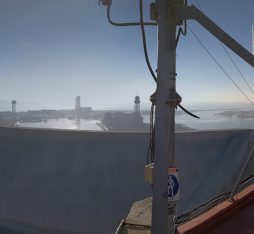“Quickly deploying a mobile network at a remote site to test and validate an immersive video service”
Open source (OS) frameworks (or software environments) enable players from the mobile network ecosystem to work together on collaborative projects that take advantage of the technological advances of networks, such as RAN softwarisation. They make it possible to directly design, test and validate innovative services that can be deployed on a large scale in the future.
An OS platform for immersive videos
Developed under the European 5G EVE project, this is an initiative that seeks to provide an experimental open source 4G/5G platform to test immersive headset-based VR (Virtual Reality) experiences. The experiment shows how an open source mobile network can be rapidly deployed both on the go and remotely in order to test out a specific use case or, over time, to meet operational needs. This network as a service was created based on the implementation of an open source orchestration tool, ONAP (Open Network Automation Platform), which instantiates VNFs (Virtual Network Functions) and manages deployment at remote sites.
End-to-end architecture
This project is the result of a collaboration between Orange and several French and European partners from the academic and industrial sectors. According to Rodolphe Legouable, Network Project Manager at Orange, the infrastructure designed within this framework and used for the immersive video use case allows “certain benefits of 4G/5G networks to be tested and validated, such as their ability to meet specific needs relating to latency, in particular, which is a key concern for virtual reality as it can provoke feelings of nausea”. Several links make up the network architecture running the experience: “The specific aim is to deploy a video application server that hosts the content as close as possible to the antenna, which then passes through the core network and the RAN before reaching the user’s VR headset. The platform is created using open source code from OpenAirInterface (OAI) Software Alliance for the RAN. The ONAP/Kubernetes orchestrator automatically deploys virtual network functions—Radio and User Plane Function (UPF) parts—to remote site(s). The network core is centrally controlled from one location, the Orange Gardens site in Châtillon, France, for the demonstration. The RAN is connected to the core network by a software core designed by the b<>com Technology Research Institute (known as the Wireless Edge Factory, WEF), which is itself interfaced with the application server”.
A breeding ground for innovation
Once this network is deployed, users will be able to connect to it to access the application server and video content. The platform also supports different frequency bands (B7, B28, B38, B40) and can therefore adapt to the allocated emission rights.
In addition to highlighting how quickly and easily a mobile network can be deployed, this demonstration more generally illustrates the opportunities created by international open source ecosystems. “Orange’s commitment to the open source world is useful in several ways. It allows us to gain knowledge of the interfaces between equipment and network features, to play with the ‘puzzle’ by mixing open source and proprietary components, among other things, and to combine efforts: The ONAP community is important because we cannot do or understand everything alone and it enables us to develop and test new services and features”.








